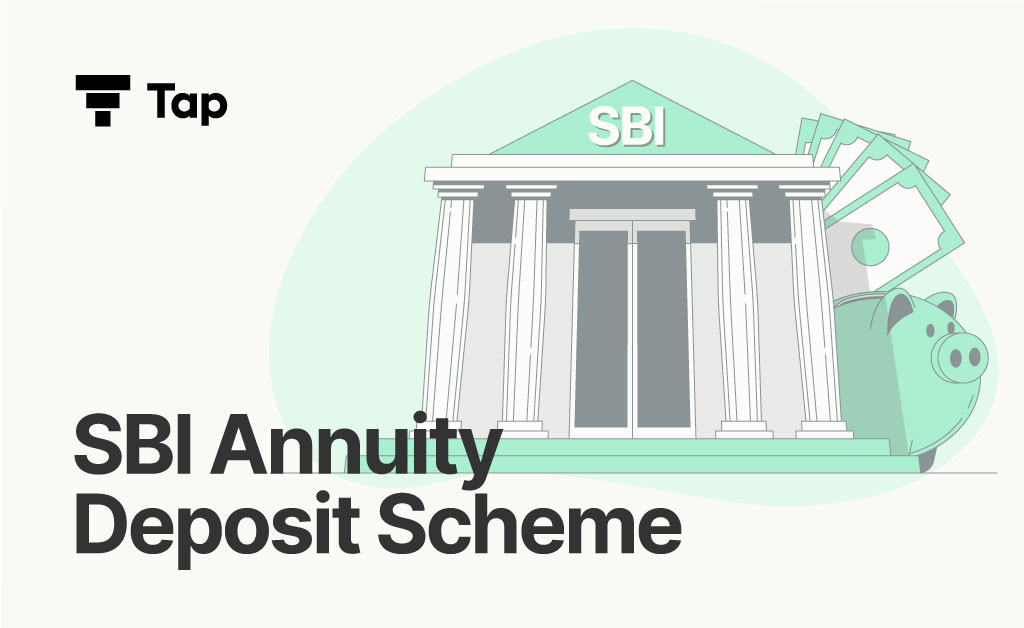SBI Annuity Deposit Scheme

The State Bank of India (SBI) Annuity Deposit Scheme offers customers the opportunity to earn regular income by depositing a lump sum amount with the bank. This lump sum is then repaid periodically as Equated Monthly Instalments (EMIs). These EMIs consist of both the principal amount and the accrued interest, with interest compounding quarterly.
Features of SBI Annuity Deposit Scheme:
Deposit Period: Available tenures: 36, 60, 84, or 120 months (3 years, 5 years, 7 years, or 10 years).
Customers can choose the period of deposit based on their preference.
Minimum Investment: The minimum investment amount is Rs. 1,000.
No upper limit on the maximum deposit amount for this scheme.
Nomination: Customers can nominate individuals to receive returns in their absence.
Provides flexibility and security for the depositor.
Universal Passbook: Investors receive a universal passbook for the annuity deposit scheme and their term deposit investments.
Streamlines record-keeping and provides transparency.
Deposit Repayment: The deposited amount is repaid periodically as Equated Monthly Instalments (EMIs). EMIs comprise a portion of the principal amount and interest.
Interest Calculation: Interest compounds quarterly. Returns are discounted on a monthly value.
Flexibility in Deposit Period: Investors can choose a deposit period of 36, 60, 84, or 120 months based on their financial goals and preferences.
Overdraft Facility: The bank may grant an overdraft or loan facility for 75% of the annuity deposit balance amount in special cases. Provides additional financial flexibility for depositors.
Premature Payments: Premature payments are allowed up to Rs. 15,00,000 for term deposits. SBI charges a penalty fee for premature payments.
Components of the SBI Annuity Scheme:
Interest Rate: Interest rates vary based on the investment tenure chosen by the customer. Interest is compounded quarterly.
Eligibility: Open to all Indian residents, including minors. Not eligible for NRI individuals.
Taxation: TDS charges apply for the returns earned through the SBI Annuity Deposit Scheme. Interest is rounded off to the next rupee value, impacting the last annuity
instalment.
Premature Payment: Premature payment is allowed in the event of the depositor’s death within the ongoing tenure. Legal heirs or joint account holders are eligible to receive the returns.
Maturity Amount: The maturity amount is paid periodically, reducing to zero at the end of the maturity period.
Limitations of the SBI Annuity Deposit Scheme:
The SBI Annuity Deposit Scheme, though promising a steady income stream, unveils certain limitations that can impact the financial flexibility and potential returns for investors. Here’s a closer look at the challenges posed by this conventional scheme:
Time-Locked Investments: The scheme binds investors to fixed deposit periods (3, 5, 7, or 10 years), restricting their ability to swiftly adapt to evolving financial goals or dynamic market conditions.
Interest Rate Uncertainties: Similar to the unpredictability of SBI’s term deposits, interest rates undergo frequent changes, injecting an element of uncertainty into the overall returns. Staying informed about the latest rates becomes paramount for investors.
Taxing TDS Charges: Investors face the imposition of Tax Deducted at Source (TDS) charges on returns earned through the scheme. The rounding off of interest to the next rupee value can introduce discrepancies in the last annuity instalment.
Penalties for Premature Withdrawals: While the scheme permits premature withdrawals, a penalty fee is levied, potentially eroding the overall returns. This penalty becomes particularly significant for deposits exceeding Rs. 15,00,000.
Fixed Returns Dilemma: The scheme offers fixed returns, a characteristic that might pale in comparison to investment options allowing for higher returns driven by market dynamics.
Why NCD Bonds Might Hold the Key to Financial Freedom?
Non-Convertible Debenture (NCD) Bonds have emerged as a captivating alternative to the SBI annuity scheme. Let’s delve into why NCD Bonds might be the beacon guiding investors toward a more enticing financial future:
Enhanced Returns: NCD Bonds typically boast higher interest rates, potentially offering investors superior returns compared to traditional fixed-income options.
Market-Linked Dynamics: Unlike the fixed returns of the SBI Annuity Deposit Scheme, NCD Bonds often feature market-linked returns, allowing for capital appreciation and aligning with dynamic market conditions.
Diverse Investment Tenures: NCD Bonds offer a spectrum of investment tenures, providing investors with the flexibility to tailor their investments to specific financial goals and time horizons.
Tax Efficiency: NCD Bonds may come with tax advantages, including indexation benefits for long-term capital gains. This tax efficiency can enhance overall returns for savvy investors.
Liquidity: NCD Bonds, often listed on stock exchanges, grant investors liquidity, enabling them to sell the bonds on the secondary market.
The SBI Annuity Deposit Scheme proves to be a fitting investment for those seeking regular income for the long term, particularly investors with a low-risk appetite. Similar to fixed deposits, this scheme offers guaranteed returns, making it a reliable option in the realm of investment. However, given the dynamic nature of interest rates, it is crucial to stay updated on the latest rates before making any commitments.
In conclusion, the SBI Annuity Deposit Scheme stands out as a valuable avenue for investors looking to tap into regular income streams. Its flexibility, competitive interest rates, and additional benefits for senior citizens make it a compelling choice in the financial landscape.
